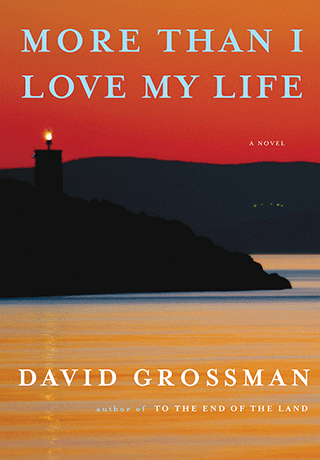Reviewed by NEAL GENDLER
If you’re looking for happiness in David Grossman’s new novel, you’ll need a magnifying glass — and great patience.
But More Than I Love My Life is riveting, well worth the investment of time and tension as acclaimed Israeli author Grossman slowly unrolls a masterfully told tale of love, torment and secrets, translated beautifully by Jessica Cohen.
The book tells of three women: Vera, 90; her mostly estranged daughter Nina, of middle age; and Nina’s daughter, Gili, 39, an aspiring filmmaker.
Filmmaking was the early career of Gili’s father, Rafi, now Israel’s oldest social worker. He raised Gili from preschool age after Nina abandoned them, vanishing without taking even a toothbrush.
The story opens in 2008, at Vera’s birthday party. Nina, looking somewhat withered, arrives from Norway. Gili finds her presence nearly intolerable.
“Rafael and Nina haven’t seen each other for five years, not since her last visit to Israel,” when Vera turned 85, the narrator says. “Nina and I also haven’t met since then.” Gili, scarred by the abandonment, wants nothing to do with Nina, saying, “she’s not my mother.”
The four are both joined and separated by trouble. Vera, daughter of prosperous Yugoslav Jews, married a sensitive Serb, Milosz Novak, with her father’s surprising approval. During World War II, he joined Tito’s Partisans, leading their cavalry. After the war, they had Nina. More than six years later, the couple was arrested on false charges of supporting a Soviet takeover of Yugoslavia.
War hero Milosz kills himself. Vera is offered freedom for denouncing him as guilty. She refuses despite being warned Nina will be put out on the streets. Vera’s next three and a half years are on a prison island, Goli Otek, suffering daily humiliation, dehydration and brutality.
Unexpectedly freed, Vera finds once happy Nina safe but distant; in adulthood, Nina says her character was taken away, then given back “ruined, destroyed.”
They come to Israel, where Vera marries a widower whose wife’s death has son Rafi in a fog, headed toward delinquency.
Rafi finds Nina mysterious: beautiful, razor thin, smart, tough and seemingly vacant, devoid of expression. Eventually they find deep love, marry and have Gili, but Nina becomes Rafi’s dybbuk (demon); he’s emotionally bound to a deserter.
And Gili is uncertain about her relationship with adoring, older Meir. He wants children. She considers motherhood unthinkable.
Dysfunctional enough for you?
Twice-widowed, energetic Vera seems the best adjusted of the four, one of the few things Grossman seems to make clear at the start. I had to read quite a few pages to figure out that the first-person narrator is Gili.
Grossman dispenses other important facts very slowly, often slipped in so quietly that they stun. For example, we eventually learn that the vanished Nina didn’t terminate all contact. After a year, she began sending Vera blank postcards every four weeks from various parts of the planet. And on page 74, we learn that Nina and Rafi talk by telephone weekly, an almost offhand revelation so astonishing that I read it several times to be sure of what I was seeing.
After a restless, tumultuous life, Nina has found peace living alone in a coastal Arctic town, believing dementia has begun.
After Vera’s party, Nina proposes making a video of Vera’s life, starting in her birth city, Cakovec, now in Croatia, and ending on the former prison island. Rafi learns Vera is willing, and he agrees. So does Gili, provided she’ll be the filmmaker.
At their destination, relationships start to change and long-hidden truths emerge.
After seeing her childhood home, Vera takes them to the former dance hall where she met Milosz. Nina becomes animated, demanding that she be filmed as she talks in the third person to a future Nina in a nursing home, memory blank.
Night falls, and they begin a long drive to the coastal hotel from which they’re to visit Goli Otok the next day. In a downpour, Rafi drives slowly as Nina coaxes her mother to tell her more about her marriage to Milosz — stories Nina says she has never heard.
As Vera talks, huddled in the back seat with Nina, Gili films, watching the pair’s transforming reactions. On the island, more truths come out while the four are trapped overnight in an abandoned, decaying barracks during a fierce storm. We learn details of Vera’s imprisonment and peculiar torture.
All this is intense, sometimes overpoweringly so, as when Gili writes of the recording Rafi made of Nina when she visited in 2003 for Vera’s birthday at 85. Nina and Rafi go for a walk, Rafi filming her rambling, intoxicated soliloquy, describing her shocking life in New York. I won’t reveal more, but that was one of several times I had to close the book, walk away and do something else to unwind.
Ultimately, More Than I Love My Life suggests mitigation of its characters’ troubles — perhaps an echo of a real-life Grossman confidante whose story he brilliantly has amplified and altered into an engrossing tale of people who loved both too little and too much.
***
Neal Gendler is a Minneapolis writer and editor.
(American Jewish World, November 2021)




















